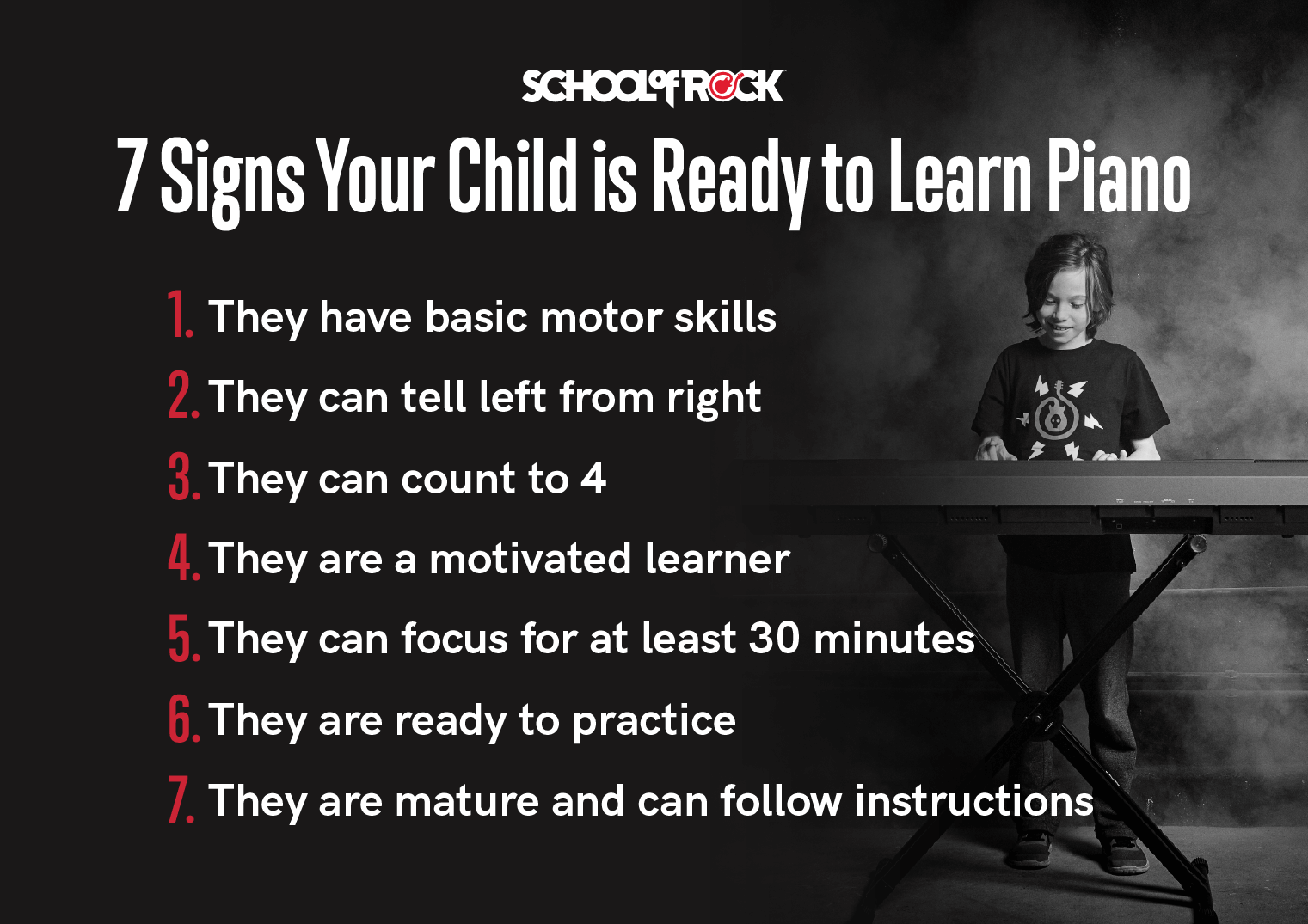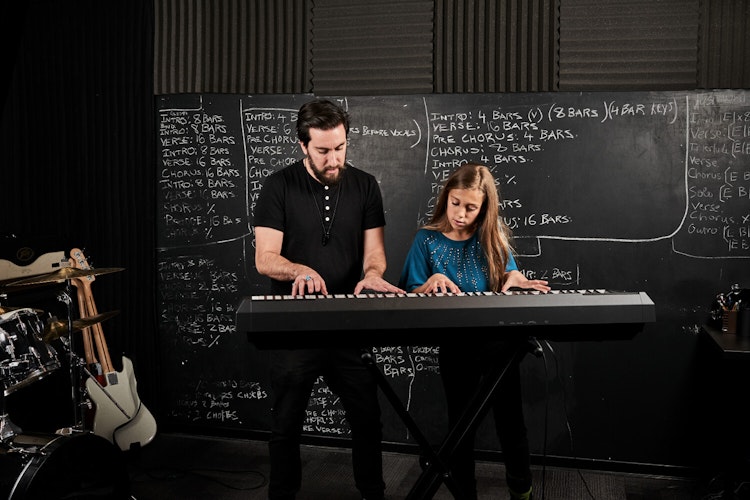Many children are drawn to the piano from a young age. It’s easy to play, fun to explore, and depending on whether you have a piano vs a keyboard, it can make a lot of different sounds! All fun aside, many parents often wonder what age their child should start piano lessons, especially if they want their kid to get good.
At School of Rock, our instructors teach thousands of students how to play the piano every day, and know a thing or two about determining when a student is ready. And while it’s true students of almost any age can learn to play piano, the best age to learn depends on factors unique to each student.
What is the best age to Learn TO play piano?
The best age to start piano lessons is typically between the ages of 6 and 9-years-old. While older students may have an easier time learning to play, students as young as 6-years-old can also learn since the keys of the piano are easy to operate. Depending on the student, even very young children under the age of five can begin to explore the piano. After all, Mozart famously started to play piano at 3-years-old!
The best age to learn piano is between the ages of 6 and 9-years-old, but some students can learn earlier.
Is your child ready to start piano lessons?
There are a number of factors that may determine when your child is ready to start learning piano. These can include physical factors like hand size, coordination, dexterity, and finger independence. But for many students, this can also include social factors, such as the ability to focus, follow a practice plan, and effectively communicate with others.

7 signs your child is ready to learn the piano:
When deciding what age to start piano lessons for your child, look for the following signs.
- Your child has basic motor skills. Students with motor control challenges may find it frustrating to play the keys on the piano, particularly if they need to reach between notes. The good news is playing piano can help these issues over time and give students newfound confidence. Piano requires only moderate finger and arm strength to push down the keys, and is easier to produce sound on than stringed instruments such as guitar or violin.
- Your child knows the difference between left and right. Playing piano involves the use of both hands. Beginner piano students do not need a highly developed sense of direction or limb independence. However, knowing the difference between left and right is needed to play most songs.
- Your child can count to 4. When starting piano lessons, knowing how to count to 4 will help your child with essential timing concepts that are required to play most songs.
- Your child is a motivated learner. In general, students who are motivated to play the piano progress at a much faster rate than unmotivated students. If your child enjoys music, or seems excited to play new songs, this is a good indication that they are ready to start learning.
- Your child can focus for 30 minutes. Consistent practice is the key to learning to play an instrument, and the piano is no different. If your child can focus on a task for 30 minutes, then they should be able to handle taking lessons.
- Your child is ready to practice daily. If your child has at least 30 minutes to practice every day, then they may be ready to start playing the piano. To inspire your child to practice, it’s important for your child to have access to a piano or keyboard at home.
- Your child is mature and can follow instructions. Children between the ages of 6 and 9-years-old can vary in terms of their social maturity. If your child is able to follow directions from instructors, they will have more success overcoming challenges.
TIPS WHEN STARTING PIANO
When starting piano lessons, try out these tips to make your kid’s music journey a success.
- Place the piano or keyboard in a busy part of your home. Keeping the piano or keyboard set-up and ready to play in a commonly-used room such as the living room, playroom, or student’s bedroom will make it convenient to play and remind your child to practice.
- Keep the piano tuned, or buy a keyboard. Any instrument should be maintained in order to keep the student inspired. It’s hard to be motivated to practice on an instrument that sounds bad, or is overly difficult to play! For this reason, pianos should be tuned regularly, but an electronic keyboard is a great alternative to a piano - not only does it take up less space, it does not require any tuning.
- Ensure that the piano stool is the right height. The piano bench or stool should always be set to a height that allows your child to play comfortably, or your child could develop poor technique – or even pain! To sit properly, your child’s arms (from wrist to elbow) should be approximately horizontal with the floor as their hands rest on the keys.
- Focus on accuracy instead of speed. Students should always practice slowly at first, with a focus on accuracy, and then gradually increase speed. Young students often rush to learn things at fast tempos at the expense of learning properly.
- Help your child manage better practice habits. When starting piano lessons, you can help your child maintain a practice schedule to make sure they’re applying what they learn from their instructors. As your child progresses and gets older, they will be able to manage their own practice time without assistance.
- Play live music in-person with other students. In addition to regular practice, we see students who regularly play piano in a group or band setting tend to progress at a much faster rate than students who only practice piano lessons alone.
IS IT EVER TOO LATE TO START PIANO?
Of course not! At School of Rock, it is never too late to learn to play an instrument. That’s why we offer the School of Rock Adult Program, where adult students of any skill level can collaborate with their peers to form bands and rock out on stage.






